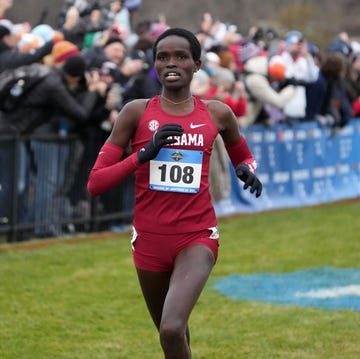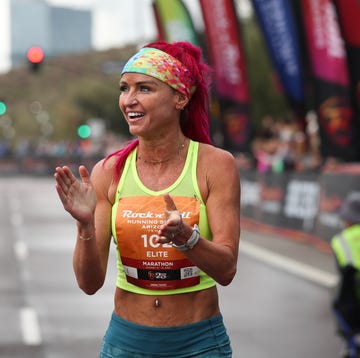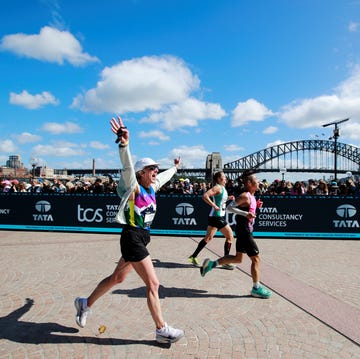Stephen Kiprotich wasn't supposed to finish his first marathon, and he wasn't expected to win his last marathon, but he did both. The Ugandan entered a marathon for the first time in the spring of 2011 in the Netherlands. "In Enschede, he was supposed to be pacing," said his manager, Jos Hermens, speaking in London after the conclusion of the Olympic men's marathon Sunday. "At 30K, everybody dropped out and he was feeling very good. He said, 'Should I continue?' I think at that moment only one guy remained. We said, 'OK, try. Continue.'"
Kiprotich went on to win the race in 2:07.20, which remains his best time. Last September, he ran the world championships marathon in Daegu and placed ninth. "We didn't know yet his capability, but we learned–today also–he's good in the heat," said Hermens.
Kiprotich ran last February's Tokyo Marathon next, finishing third, and he was surprised, said Hermens, to beat Ethiopian former world marathon record-holder Haile Gebrselassie. "But he was training very well," said Hermens. "We know he was training well with his coach, Patrick Sang, in Kenya, in Kapsabet. [Sang] told us he was making good progress."
Kiprotich, who trains in Kenya, then entered the London Olympic marathon, in which Kenya's strong team was favored. '[Sang] told us also now, 'Watch out for this guy. He's in very good shape,'" continued Hermens. "But we didn't expect him to win. We thought, last year ninth, maybe this year top five, and then next year, take the next step."
On Sunday, Kiprotich and Kenya's two-time world champion Abel Kirui followed a surge by Kirui's teammate, the reigning London Marathon champion Wilson Kipsang, and in the 23rd mile, with just the three East Africans remaining in the lead, Kiprotich fell back. "At that time, I was thinking it may be my luck, because Kiprotich was behind and I knew that Kipsang was already tired," said Kirui.
"Before I started to race, I was thinking maybe Kenya will win, maybe Ethiopia will win," said Kiprotich. "I didn't believe I can win the race. But when it came to the 23rd mile, that's when I decided."
"All of a sudden, I see this guy was going," said Kirui. "I had to maintain my position. When I was pushing–I was really pushing–it was very hard for me to close the gap. I knew then he was gone. We were actually fighting for positions two and three."
"What was in my mind was to win a medal, any medal, to represent my country," said Kiprotich, who then modified that plan slightly. "You know, it's like, when you aim for something, after getting that something, you aim for another."
So mid-race, Kiprotich decided getting Uganda's first Olympic medal since 1996 wasn't good enough. He was going for the nation's first gold since John Akii-Bua in 1972. "I looked back. I said, 'Let me go,'" said Kiprotich. And just like that, the native of Kapchorwa in eastern Uganda near the Kenyan border took off and was never headed, winning his first Olympic marathon in 2:08.01 and carrying the black, yellow and red stripes of his nation's flag even before he crossed the line.
"I've been dreaming, 'Can I be like John Akii-Bua?'" said Kiprotich. "Today I joined the champions, so I am happy."
Kiprotich used to compete at a meet held in the 400m hurdles champion Akii-Bua's memory in the capital, Kampala, or in the city of Jinja. "All the time, we have to go and honor him," said Kiprotich. "I always like to go there. I come in last, in the middle; in 10,000, in 5000; but my race was the 10,000 and I was number [two] in 2006."
Kiprotich ran 29:19.4 for 10K at altitude then and raced internationally after that, earning a personal best of 27:58.03 in Birmingham in 2010 and taking sixth at the 2011 world cross country championships before following the advice that he try the marathon. Among others, Kiprotich trains with 2011 London champion Emmanuel Mutai, who was the third member of Kenya's 2012 Olympic marathon team and placed 17th.
Kiprotich said his coaches had confidence he could do well at the Olympics. As far as most observers were concerned, though, his win was completely unexpected. There were Ugandan hopes placed on former world 5000m bronze medalist Moses Kipsiro, who finished 10th in the 10,000 and 15th in the 5000 in London. The 2005 world champion in the women's steeplechase, Dorcus Inzikuru, was also competing but didn't make her final. "Someone called me from Kampala," said Ugandan journalist Norman Katende in London on Sunday evening. "After the performance of Kipsiro and Dorcus Inzikuru and others, [people in Uganda] thought that another Olympics without a medal is gone. But I had hope in Kiprotich."
Kiprotich had posted, "Am coming with the weapons to save our country" on Katende's Facebook page in the week before the Olympic marathon.
"Everybody had given up," continued Katende. "Nobody was watching until they saw him going in the top three. By the end of the marathon, everybody was glued on the TV, watching. People are on the tabletops celebrating. The city has gone crazy because it's 40 years since we won a gold medal and 16 years since we won a medal in Atlanta, and that was a bronze medal in the 400m hurdles."
Shortly after his celebration at the finish line, his face beaming, Kiprotich said he now wants to come back to the city that put his name on the world's radar.
"Maybe this race will earn me a ticket to go and run next year's London Marathon," he said. He has defeated the prestigious race's last two champions in the same city, albeit on a different course, and a Ugandan has never won that event either, setting up the possibility of an intriguing challenge for the race's veteran competitors and for the new Olympic champion.













